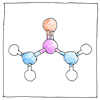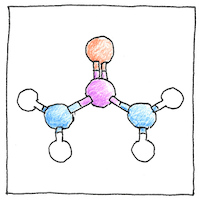Friedrich Wöhler
chemistry

|
Synthesis of urea
“I can make urea without a kidney of man or dog,” said Friedrich Wöhler. Louis Pasteur went further in claiming a chemist could create life which was not proven until 1897 when Eduard Buchner showed that enzymes from yeast could convert sugar to alcohol a biological process—fermentation— occurs without living cells.
Enzymes
tiny scrapers clean my dishes tiny motors pickle my cucumbers tiny screwdrivers turn grape juice to wine tiny levers convert starches to sugars and ferment the sugars to raise my buns tiny glue guns coagulate my cheese
Vital forces
Nothing special about life in general except that we in particular share it and a complexity that cannot be explained by chemical analysis. Life could begin again where chemicals meet by chance with photons from the sun. Achieving consciousness could be a matter of only time and degree. Even those who think a monkey has no soul could in time agree.



Urea is made naturally by the kidney. Wöhler’s preparation of urea without the help of a living cell was thought to be the first step toward the creation of life in the laboratory, the first synthesis of an organic compound, and his discovery was an accident!
Wöhler became a pioneer in organic chemistry. He co-discovered beryllium, silicon, and silicon nitride, he discovered aluminum, he isolated yttrium and titanium, he discovered how to purify nickel, and he showed how to synthesize other compounds including calcium carbide.
Enzymes hasten natural reactions without being “consumed by the reactions they catalyze, nor do they alter the equilibrium of these reactions.” They have many industrial applications as well as having dependencies in animal biological activites. “Almost all processes in a biological cell need enzymes to occur at significant rates.”
See also in The book of science:
Readings: